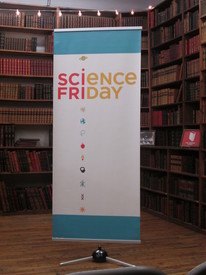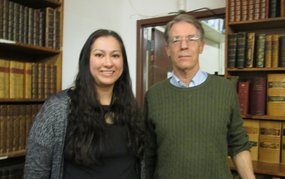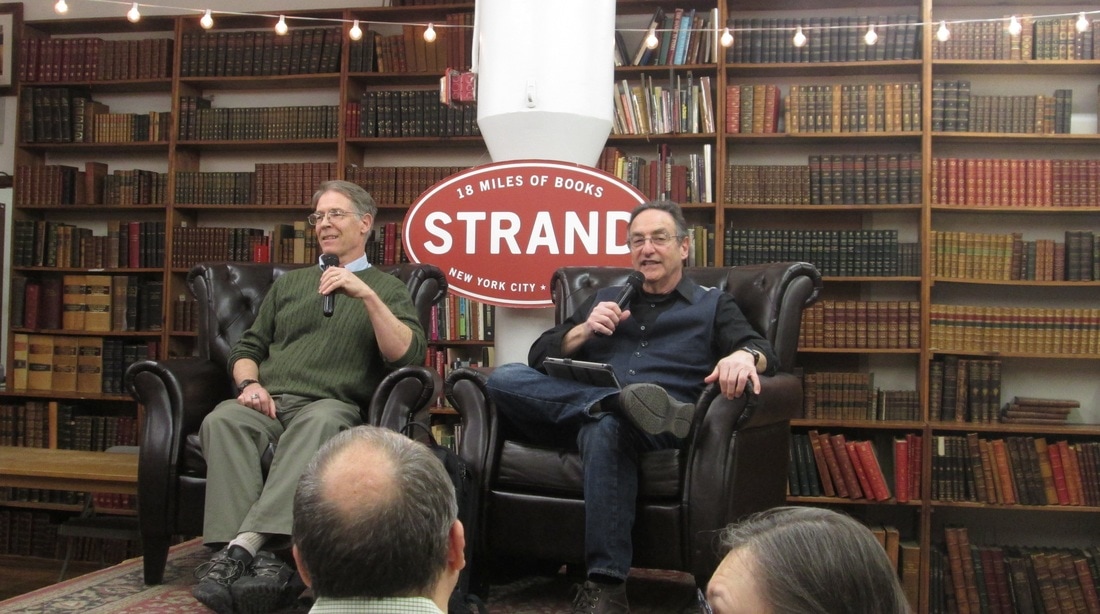|
No, I'm not talking about New York City as it is today - as far as I know, 50 feet of water won't come washing it away anytime soon. But this is the idea behind Kim Stanley Robinson's new book, New York 2140. I was lucky enough to attend the Science Friday event last night at the Strand bookstore with Kim Stanley Robinson and Ira Flatow. Although I've loved Mr. Robinson's writing since I first read his novel The Years of Rice and Salt over a decade ago, it was great to finally hear him speak about his work and some of the ideas and motivations behind it.  Mr. Robinson's new book focuses on a New York in the future that has come to resemble Venice because of the dramatic rise in sea level. When Mr. Flatow asked the native Californian why he picked New York, Mr. Robinson's answer got a cheer from the crowd: "New York is more interesting." A lot of the questions centered around social commentary of things that wouldn't just be relevant in the future, but are also important today. For example, there was discussion about the American class system, which Mr. Robinson jokingly called "income inequality," since most Americans don't like to draw attention to the fact of a class system here. Mr. Flatow pointed out an interesting tidbit in the book about a woman who operates a dirigible to save endangered species, and that sparked a whole discussion about land reclamation, conservation, pollution and the effects of globalization. Having read several of Mr. Robinson's earlier books, it came as no surprise that he had very decided ideas about the social and political landscape of today. However, he had the audience laughing throughout the talk with his dry humor, which contrasted with the outrageously opinionated things he would say. For example, Mr. Flatow brought up Margaret Atwood's controversial take on science fiction writers - namely, that she would not label herself as one. Mr. Robinson's response: "I hate that crap. I hate it! It's science fiction - any writer who writes science fiction and says it's not because you think you're a genius... I hate you and I'm not going to read you anymore," he added, garnering another chuckle from the crowd. He said he's proud to be a science fiction writer, that this was the genre that best defined who he was growing up: "I started writing science fiction because I grew up in California," a place that started out as heavily agricultural when he was a kid and quickly became the tech capital it is today. "Science fiction is the best literature in describing what reality feels like."  Mr. Robinson and me when he signed my copy of his book after the event. Mr. Robinson and me when he signed my copy of his book after the event. Mr. Robinson also talked about his writing process, both during the initial interview and when he took audience questions. Mr. Flatow asked if he knew the ending of a story when he began writing it. "Yes, sometimes," was the answer. Mr. Robinson spoke about his work-in-progress, a novel where China takes over the moon, and how he already knows the ending. But that's not always the case. When asked by an audience member about the increasing politicization of his work from the first novel to his most current, his response was for people NOT to go back and read his first book, which got a laugh from the crowd. But he also talked about his day-to-day writing process. He always writes outdoors, for about three hours a day, but then he spends a lot of time gardening, which allows him to, "Get my hands dirty and sit out there in the sun and get antsy and think." As to the idea of writer's block, he said he hated the idea of it and would rather write something unusable than not write at all. "I do write a lot of crap, but I'm a big reviser." His advice for a new writer? "Gather with a group of like-minded friends... don't do it in classes." Also, "Let things hang around for a while and revise them. And then let go and move onto something else so you don't get hung up on one project." For the aspiring J.K. Rowling, "It is an absolute accident that people make money at fiction writing." If you love writing, do it because you love it - don't expect riches. A final note about his process, which I thought was interesting, was when he was asked about how he came up with his characters, many of whom are wildly different than him. "I love the idea that novels are not personal testaments. ... I don't want to be there. ... Novels are not about personal expression, they're about being the voice of the community." And for fans of Mr. Robinson's Mars trilogy, an audience member asked if it would finally make it to television, since it's been picked up several times by networks, but never actually made it to the small screen. His response was positive: "Hope springs eternal." For all of Mr. Robinson's fans out there, I think we can all agree that it does. I'm excited to read New York 2140 - keep an eye out for my review of it soon.
0 Comments
Leave a Reply. |
Who the heck is Alison McBain?I am a freelance writer and poet with over two hundred short pieces published in magazines and anthologies. Check out my 2024 writing challenge to write a book a week at Author Versus AI. For more info, please check out my "About Me" page. © Alison McBain. All rights reserved
Archives
July 2024
|




